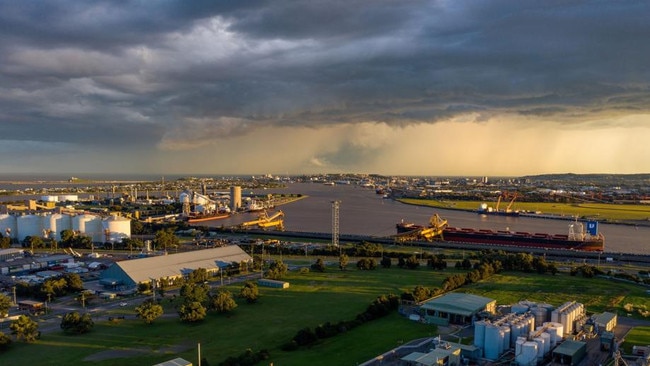Yancoal received takeover approach from Chinese parent in April, amid election campaign
An offer for Australia’s biggest listed coal miner by its Chinese state-backed majority shareholder looms as the first major test of Labor’s approach to foreign takeovers.

Yancoal sat on a takeover offer from its Chinese state-backed parent company for more than a month as the federal election campaign raged, with news of the lowball bid only disclosed once election was won.
Yancoal said on Monday it had received a ““unsigned, non-binding” approach from Yankuang Energy Group on April 29”, more than two weeks after Scott Morrison set May 21 as the date for the national election.
The company immediately appointed an independent board committee to negotiate over the offer from Yankuang, but the existence of the bid was not disclosed until Yankuang went public through a disclosure to the Hong Kong exchange on May 25.
Yancoal’s IBC chairman, Greg Fletcher, told shareholders at the company’s annual shareholder meeting in Sydney on Monday that the Yancoal board had kept details of the Yankuang offer closely held between board members and its financial advisers until the Chinese state-backed coal miner made them public last Wednesday night.
“Until Wednesday night we did not see any requirement – particularly a legal requirement – to disclose the transaction as we saw it as being incomplete and uncertain, which it still is,” he said.
Yankuang told the Hong Kong stock exchange last week it was considering a move to take Yancoal private, floating the prospect of issuing convertible notes at $US3.60 ($5.08) a share to shareholders controlling the 37.7 per cent of shares it does not already own.
The Yankuang offer is $1 per share below Yancoal’s last closing price on the Australian Securities Exchange. It closed at $5.33 on April 29, before the offer was made.
But the offer was made in the early stages of a heated election campaign in which Mr Morrison’s government – and particularly then-Defence Minister and now opposition leader Peter Dutton – had sought to portray Labor as likely to soften the government’s hard line policies on China.
In addition, the bulk of Yancoal’s operations sit in the NSW Hunter Valley, within a Labor-held seat targeted by Barnaby Joyce as a possible gain for the Nationals.
In the lead up to the election, Labor leader Anthony Albanese had positioned the party as being in lock-step with the former government’s policies on China, which included tight scrutiny of the acquisition of Australian companies linked with state-owned Chinese enterprises.
Yankuang’s lowball bid now looms as the first major test of Labor’s approach, given the Hong Kong-listed energy major may only have to convince three major Yancoal shareholders to accept its offer to win all-but total control of the company.
Yankuang already owns 62.3 per cent of Yancoal, Australia’s biggest listed coal miner. China Cinda Asset Management owns about 15.9 per cent of Yancoal stock, with Glencore holding 6.4 per cent and China Shandong Investments 5.4 per cent.
Acceptance by all three would take Yankuang to just under the 90 per cent threshold needed to acquire the rest of Yancoal stock through compulsory acquisition rules.
But the fate of Yankuang’s bid may ultimately rest with new federal treasurer Jim Chalmers and Australia’s Foreign Investment Review board.
Yankuang is still bound by the terms of a 2012 ruling by former Labor treadsurer Wayne Swan, made when Yancoal merged with Gloucester Coal, to maintain a shareholding below 70 per cent of Yancoal stock and to keep the company listed on the ASX.
Mr Chalmers would likely need to waive those conditions in order for Yankuang to move ahead with its offer.
Mr Fletcher told Yancoal shareholders on Monday no representative of the company had been in contact with the FIRB or Mr Chalmers over the bid.
“Yankuang Energy may have been in contact with the Foreign Investment Review Board,” he said.
Mr Fletcher said the IBC, including GeoffreyRaby – Australia’s former ambassador to China – and Helen Gillies – were still in talks with Yankuang over its offer, seeking to clarify details of how the convertible note issue would work for minority shareholders and why the bid was launched at a discount to Yancoal’s market value.
“We are very conscious that we are representing all shareholders and we are working in their best interests. We have been and we will continue to work in their best interest to achieve hopefully a good and the best outcome for those shareholders,” he said.
The bid comes as rivers of cash roll into the coffers of Australia’s biggest coal miner, after the global energy crunch pushed thermal coal prices to record highs earlier this year.
Yancoal’s Australian coal mines threw off about $1.9bn in operating cash flow in 2021, when the company realised an average price of only $134 a tonne for its thermal coal.
Even though output is expected to fall in 2022, from 36.7 million tonnes to about 35 million tonnes, Yancoal chief executive David Moult told shareholders he expected coal prices to remain strong over at least the next year.
“Our view at the moment is that this market will remain stronger for a while. There is no new capacity coming on stream at the moment and none of the companies here in Australia have got latent capacity sitting there idling waiting to come online,” he said.
“There is no easy solution to the shortage of coal. Market demand will continue to stay strong because of the uncertainty with the energy balance globally.”
Yancoal shares were down 7.1 per cent at $5.65 just after lunch on Monday.





To join the conversation, please log in. Don't have an account? Register
Join the conversation, you are commenting as Logout